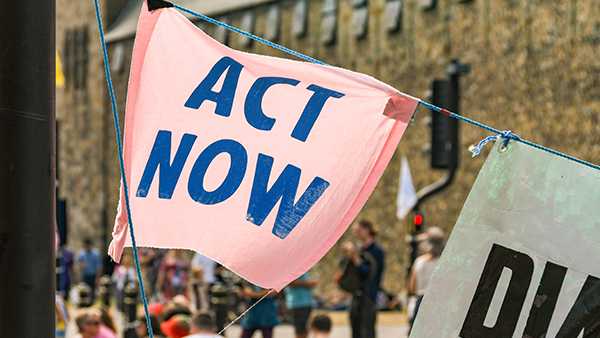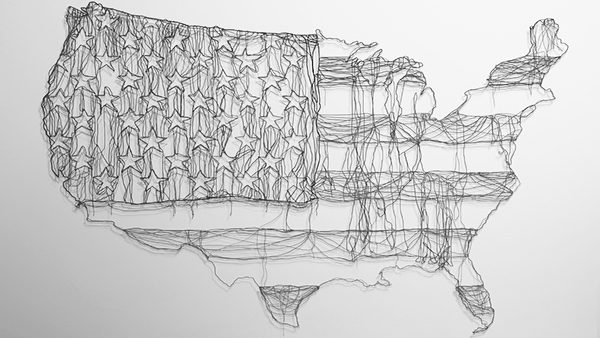By the time Tony Blair fought the 1997 General Election his campaign team had managed to boil down Labour’s message to three self-serving dichotomies; ‘for the many not the few’, ‘for the future not the past’ and ‘strong leadership not drift’.
These are the kind of platitudes that might look nice chiselled on to a large piece of stone; yet, obvious though they are, the second of the three has been largely absent from this election campaign.
In one sense the election is all about the future; which party is going to run the country and what they are going to do. But when the politicians talk they describe a very recognisable place: for the most part the 2015 General Election is about who can make tomorrow better than yesterday on the assumption that it will be largely like today.
In contrast, a developed future narrative has the following components:
- A set of predictions about how the future will be qualitatively different to the present
- An account of the kinds of challenges and choices this future poses, not just for political leaders but for all of us
- A claim that one set of values is particularly- even uniquely – suited to meet those challenges
I am sure the major party leaders can all point to speeches when they or a front bench colleague has said something along these lines, but in political communication it’s not what’s in your stock room that matters but what you put in your shop window. With polling 48 hours away we can now say the future – in the sense I mean it - has been an absentee from this election.
This is disappointing for one tactical and one strategic reason. Tactically, with one of the two major UK parties being accused of complacency - looking as though they think things are pretty much on track - and the other of failing to learn from the past; surely both could have done with a much stronger story about their understanding of, and readiness for, future challenges and opportunities?
Strategically, the election is another missed opportunity to use a mobilising story of future possibility to persuade people of the need for important choices. Instead, as just about every thinking commentator has said, the election has deteriorated into a parade of populist promises leaving one with the question; which would be worst for Britain – that the winning party reneges on its promises or that it tries to deliver them?
From lagging productivity to personal debt, from climate change to our broken model of capitalism, from technology to globalisation, from population ageing to fractured communities; these are long term issues that require long term solutions. Most will require us to go through a valley of change in which things may get tougher before they get better. An election is a chance to get some kind of mandate for difficult change. Yet no mandate has been sought, none has been won and one thing all the pundits agree is that the next Government – however long it lasts - is likely to be weak.
The election matters. There are real choices. Everyone should vote. I have nothing but admiration for the foot soldiers (one of whom I used to be) who pound the streets, most with no motivation other than a sense of what is right for the country. Our politicians generally do their best but – as they freely admit in private – it simply doesn’t pay to try to construct an argument that people find challenging. As Charles Handy says in the introduction to his new book; ‘bold thinking has become too suspect and too risky for those supposedly responsible for our future’.
I will be glued to my TV on Thursday night, and no doubt I’ll be fascinated by the post-election machinations, but perhaps the most important time will be when some of the parties have eventually to admit defeat. It is from the ashes of disappointment that a new type of political leadership will eventually emerge.
Later this week I will describe some of the characteristics we need that new leadership to display.
Related articles
-
The public are ready to go further and faster on net zero
Anthony Painter
The public are ahead of policy-makers and, indeed, most of the business world. COP26 is an enormous opportunity to catch up. Global leaders should take it.
-
Can progressives ever stop the in-fighting?
Matthew Taylor
Biden's victory has caused the left and moderates to fracture again.
-
Can President Biden bring America together again?
Anthony Painter
There is a long road ahead for the new president.




Join the discussion
Comments
Please login to post a comment or reply
Don't have an account? Click here to register.
I agree Matthew.
Like nervous prospective parents who can't see nor less discuss what happens the day after their first child is born, today's political leaders can't bear to face the reality of what parliamentary life will be like after Thursday's election. The voters look certain to deliver a result which means no-one is in overall control and so like it or not, political leaders need to work out what honest effective leadership looks like in that situation.
Lessons from elsewhere in the would seem to show this means being able to share control and to find ways of governing with consent - if not consensus. That is not in the DNA of much of the current political leadership in Westminster, although it exists much more in local and regional government. And the UK media has created an environment in which even if wise politicians know they have to collaborate across a divide in order to govern, they may well believe they can't get elected if they say so.
"An election is a chance to get some kind of mandate for difficult change. Yet no mandate has been sought, none has been won and one thing all the pundits agree is that the next Government – however long it lasts - is likely to be weak."
Have governments ever been proactive in leading change, or have they always been essentially reactive, responding to a swell of public opinion? There's a saying in Austria that if you want to lead Austrians, find out where they're going and go in front. I suspect that many supposed electoral mandates in the past were just this.
If I am reading the runes correctly, the groundswell of popular opinion is for radical change - change in our polity, our economy, our national moral imperatives, but that no single party, not even the insurgents, are seeking a mandate for the kind of change that would win an election clearly. And as the scale and scope of radical change may pose existential threats to the largest and longest established political parties, it is not unreasonable for their institutional reaction to be one of counter-reform.
On the bright side, if we do find ourselves in a mess on Friday it will be cathartic. And I agree - from these ashes will arise a new hope.
Indeed, the campaigns have lacked any focus on the economic challenges we face let alone what policy prescriptions they may have for them under any stated strategic purpose.
Vision itself has been driven from this election like a destitute child, ironically left begging for recognition of value amidst a pathetic display of personality politics.
We can only hope that the negotiations to determine who shares power produce a policy programme for government which raises hopes as well as sights!
Ross Martin
Fellow
I agree that our politicians have failed to describe how they intend to meet the challenges ahead. This is at least partly because of the huge uncertainties engendered by the likelihood of a hung parliament and the possibility of a referendum on leaving the EU. It is inexcusable, though, that they have not offered a map for the future of British politics: either the need for devolution, particularly after the close vote in the Scottish referendum, or the need to respond to a reviving interest in politics which is manifesting itself as support for smaller parties. It is time for a review of Britain's electoral system http://wp.me/p3a14k-eu